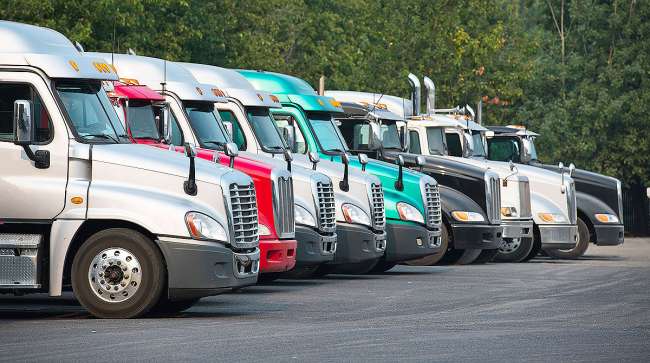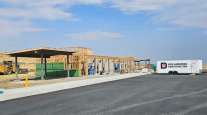Staff Reporter
Government Groups Launch Truck Parking Survey for Northeast Region

[Ensure you have all the info you need in these unprecedented times. Subscribe now.]
Truck parking challenges in the Northeast amid the coronavirus pandemic — due in part to shipment type or route changes — are being surveyed by a group of 13 transportation departments and metropolitan planning organizations.
The survey, designed to take less than five minutes, asks participants more than a dozen questions, including how frequently they make trips to New York, New Jersey, Connecticut and Pennsylvania; what type of load they typically haul, how their truck movements have changed during the pandemic and where they usually park.
Anne Strauss-Wieder, director of freight planning for the North Jersey Transportation Planning Authority, one of the groups conducting the survey, said it is meant to extend the conversation surrounding the “criticality” of truck parking.
“We also wanted to take a quick pulse of the drivers to see how they were doing in terms of their daily deliveries of emergency supplies and also what’s happening [around] the need for truck parking,” she said.
NJTPA is a metropolitan planning organization. “Goods movements don’t stop at a state boundary. Everything is integrated,” Strauss-Wieder said.
The 13 groups conducting the survey consist of 10 metropolitan planning organizations (MPOs) representing New Jersey, New York, Pennsylvania and Connecticut, as well as the New Jersey Department of Transportation, the New York City Department of Transportation and the New York City Economic Development Corp.
The MPOs make up the Metropolitan Area Planning Forum, created in 2008 as a result of Federal Highway Administration and Federal Transit Administration recommendations.
Strauss-Wieder said the group identified three types of needs associated with truck parking: hours-of-service regulations, staging and destructive situations. If a trucker runs out of service hours, he or she will sometimes park in an unsafe location, such as the shoulder of a highway or ramp. Staging means having to wait somewhere, such as an industrial property, until an appointed delivery or pickup time. Destructive situations, such as the closing of a major turnpike, may require emergency overspill locations where trucks can park safely.
The survey has garnered more than 200 responses in the week following its May 8 launch, Strauss-Wieder said. The survey will close June 5 and the results will be shared with the Federal Highway Administration this fall.
Respondents represent a range of the driving community, from for-hire and private carriers to owner-operators.
Parking availability, or lack thereof, is a concern for the trucking industry. Truck parking ranked No. 5 on the American Transportation Research Institute’s Top Industry Issues report, released Oct. 6.
Cathy Farrell, co-chair of the American Society of Civil Engineers’ 2018 Pennsylvania report card on infrastructure, identified aging infrastructure, dense populations and high traffic volumes as challenges associated with travel, including freight movement, in the Northeast.
According to the report card, truck traffic accounts for more than 34% of the travel on Pennsylvania interstates, which is more than double the national average.
“What we find is that, in the Northeast, we are just older states,” Farrell said. “All of our infrastructure is older in general to begin with. We also have four seasons, so our infrastructure experiences really far extremes, where it can be really cold and it can be really hot. It’s just a recipe for infrastructure to show deterioration.”
Strauss-Wieder said information on the region’s truck parking situation will be conveyed to the freight industry, local communities and elected officials.
“If anything, the pandemic has just solidified the fact that we all need to work together and we are working together and we’re getting things done,” Strauss-Wieder said. “There may be a silver lining that people understand supply chain now. The value, which we’ve always known, has become apparent again.”
In terms of future challenges, Farrell said the coronavirus pandemic’s drastic effect on state transportation revenue may impact allocations for truck parking services.

COVID-19 has been a wakeup call to many businesses. Knowing the location and status of freight makes all the difference in navigating uncertainty. Host Seth Clevenger speaks with supply chain visibility experts Glenn Koepke and Francis Roy. Hear a snippet, above, and get the full program by going to RoadSigns.TTNews.com.
Dozens of statewide stay-at-home orders established because of the pandemic have resulted in a decrease in vehicle travel that has hurt transportation revenue sources, particularly fuel taxes and tolls.
In a letter to the Pennsylvania Congressional Delegation, Acting Secretary of the Pennsylvania Department of Transportation Yassmin Gramian said the agency is estimating a loss between $800 million and $900 million in revenue from fuel taxes and license and registration fees.
Farrell said that departments of transportation and turnpike authorities will likely have to resort to “Band-Aid fixes” in situations where full replacements are really needed.
“With the pandemic and the reduced revenues, I do also get concerned as that is going to just require that the states tighten their belts,” Farrell said. “They’re going to be having to make some really difficult decisions ahead of them as to if that’s something that they’re going to be able to continue to pursue to provide more truck parking.”
Want more news? Listen to today's daily briefing:




